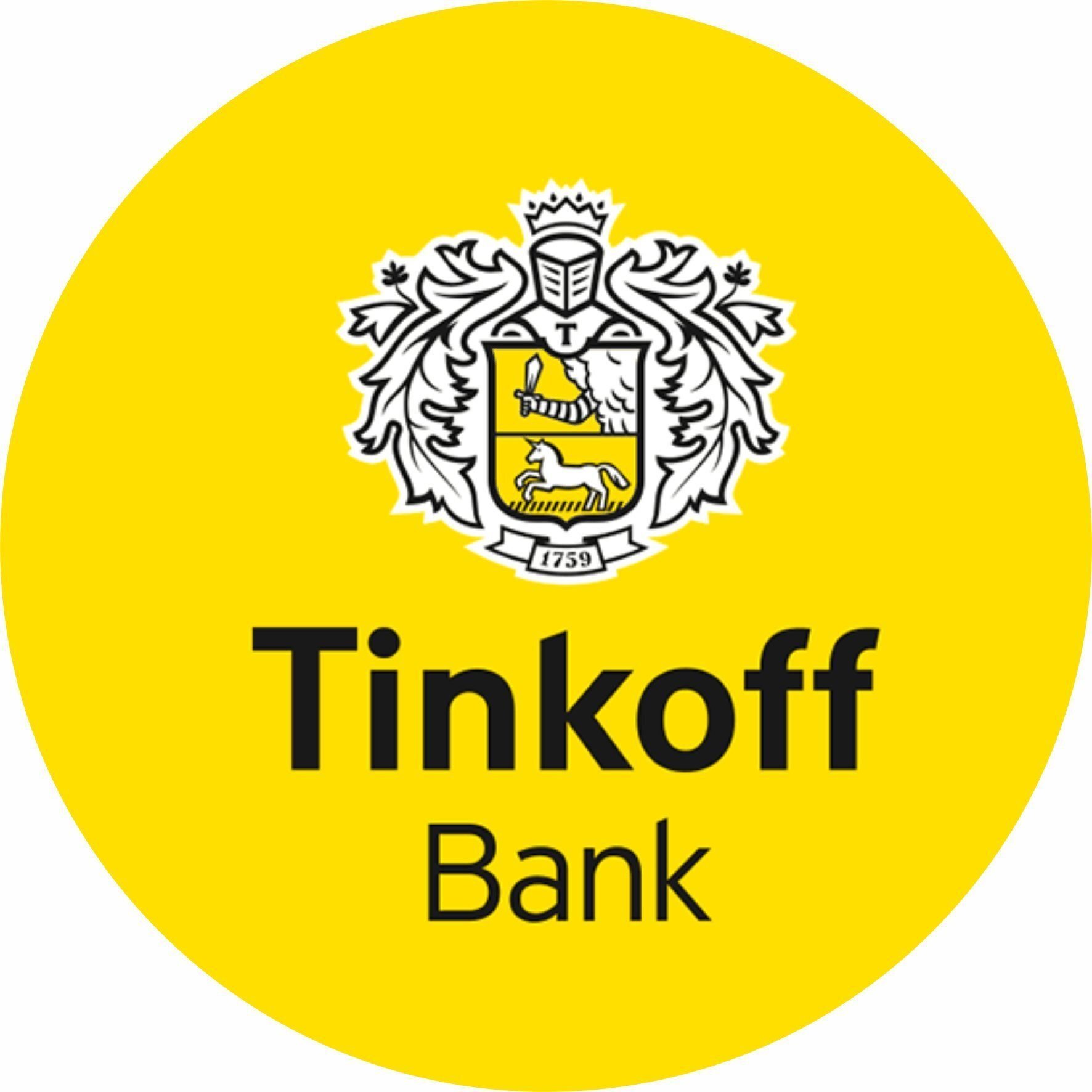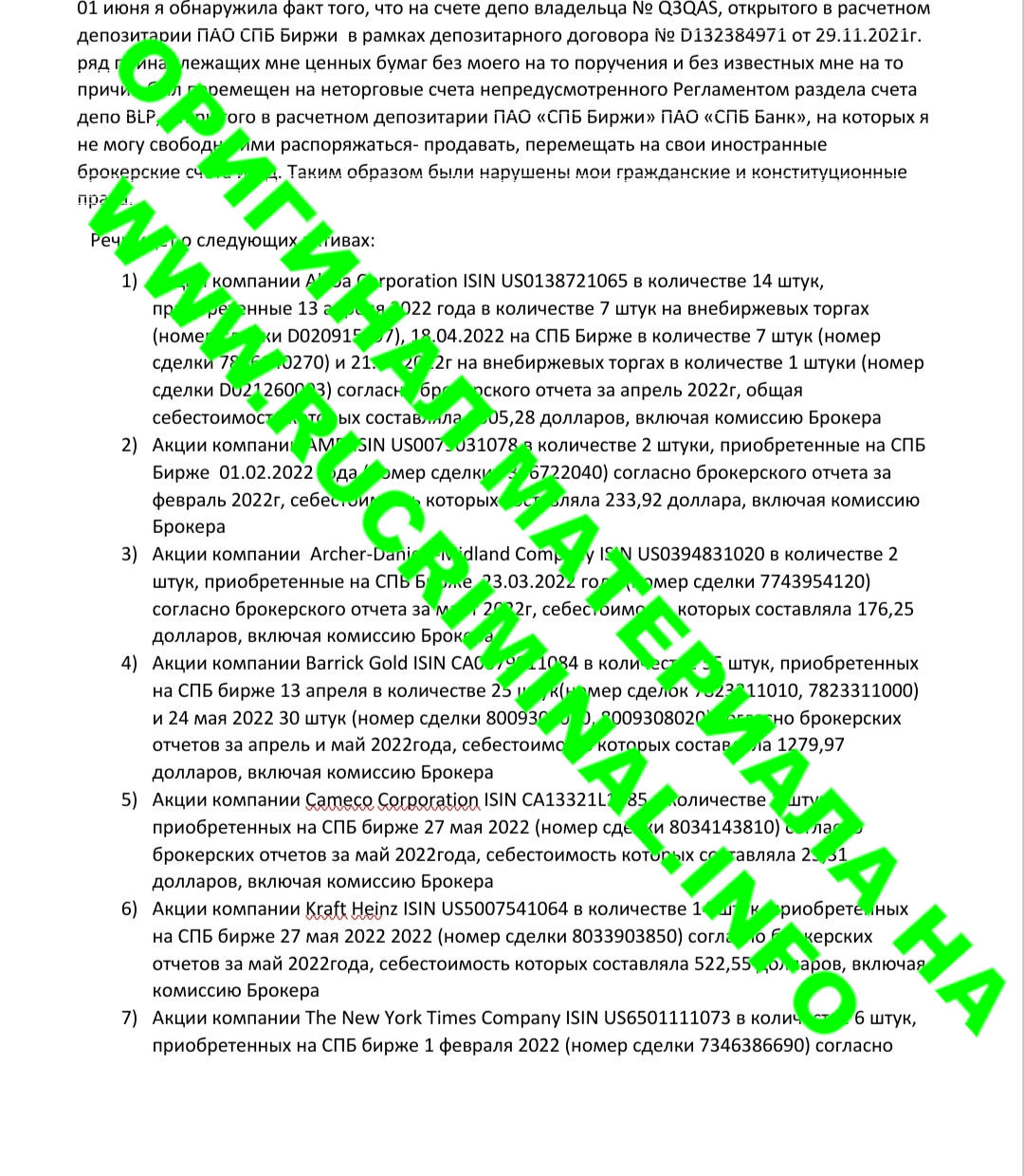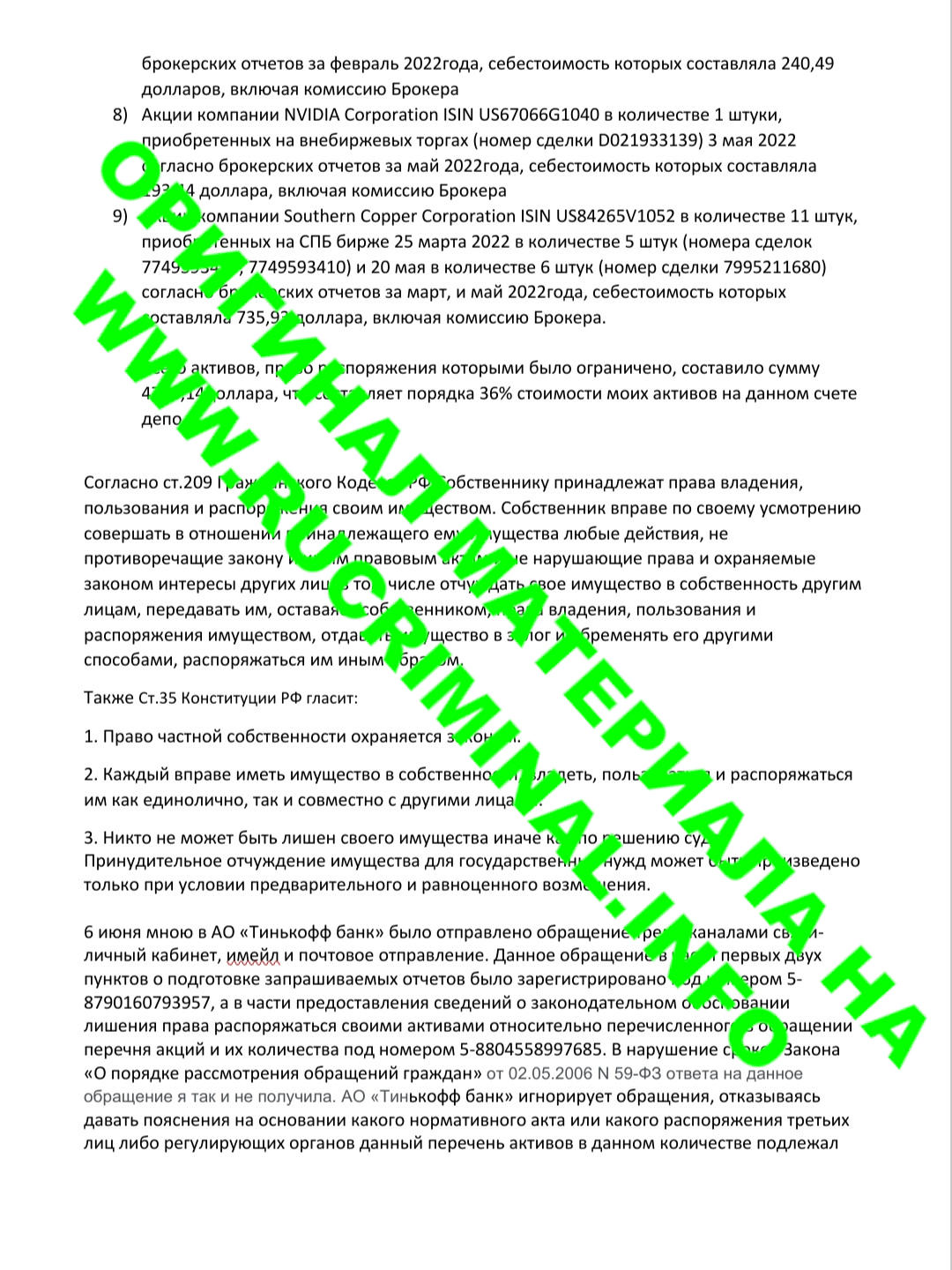Source: www.rucriminal.info
The VChK-OGPU Telegram channel and Rucriminal.info continue to talk about the most grandiose financial scam in the Russian Federation since the robbery of the people by Sberbank of the USSR.
On May 30, 2022, in the "News" section on the Tinkoff Bank website, a statement was published about the blocking of 14% of the volume of securities traded on the St. Petersburg Exchange, which are stored in NPO JSC NSD and were blocked by Euroclear.

In the case of Tinkoff Bank, the promised 14% of the volume of securities subject to blocking by the Central Bank actually turned into a blocking of an average of 32-33% of all assets of the clients of this broker, which is evident from the attached file of the list of blocked assets of 20 clients of this bank, to whom I provided support in terms of drafting applications to investigative bodies and in claims work.
After multiple requests for documents, Tinkoff Bank responded only to the official claim that the basis for the blocking was the Central Bank's Order No. 018-38-6/4762 dated 05/30/2022 for another "careful transfer".
Despite the fact that as of 30.05.2022, neither Tinkoff broker nor St. Petersburg Exchange were under sanctions from any country, this did not prevent them from citing Euroclear sanctions when blocking, transactions with which had been suspended since the beginning of March 2022.
At the same time, if we open the details of Tinkoff Bank JSC for the transfer of securities of their depositors on page 4, we will see that the transfer of American securities is by default linked to the depository account of St. Petersburg Exchange in the same BONY, to the so-called DTC ID BONY, in which a sub-account was opened for St. Petersburg Exchange structures. The bank did not provide any response to any request for information on depository chains or the submission of analytical accounting statements confirming the presence of blocked securities in NSD and Euroclear.
It is also no coincidence that the purchase date of most of the assets blocked by the broker and the exchange falls on April and May 2022, after the suspension of cooperation between Russian financial institutions and Euroclear. By the end of March 2022, all sanctioned brokers except Sovcombank had transferred their clients' assets to non-trading accounts. And already in April, the process of replacing liquid assets of non-sanctioned brokers with illiquid assets of sanctioned ones began with the help of repo transactions and changing storage locations for them, with the help of debt assignment agreements, and also, possibly, transferring securities of the victims to third-party mutual investment funds, which allowed the broker Tinkoff Bank JSC, in collusion with the structures of the St. Petersburg Exchange, to take possession of the assets of its clients and dispose of them at its own discretion without having any grounds for this and even, unlike VTB, force majeure in the form of sanctions, which can cover up any crime! Indirect evidence of this is the unwillingness of the broker and the St. Petersburg Exchange to disclose, at the request of the victims, both the depository chains of storage locations, and the accounting entries and correspondence of accounts for our assets. They refuse to do this even in court.
Also, if you look at the brokerage reports, an official document that the broker issues according to its Regulations every month, then in section 3.1, where the movement for each type of asset for the month and its market price are indicated, you can see an obvious discrepancy.
In May 2022, in the brokerage reports of Kolomoitseva E.V. and Skorikova T.N. in section 3.1, the price of assets changes currency and becomes ruble instead of dollar, and in the brokerage report of Vasilenko V.Yu. the prices simply disappear. And here it should be noted that on the Moscow Exchange, securities of American companies were quoted in rubles and it was for them that settlements were made through Euroclear. These securities had a separate ticker with the post-prefix RU. On the St. Petersburg Stock Exchange, securities were recorded directly in the US central depository DTC and always had only a dollar value. Therefore, this currency failure in brokerage reports, together with the dazzling repo transactions that the broker carried out independently without the client's consent, confirm the hypothesis of a deliberate change in storage locations.
Suspecting that the assets were appropriated by the broker, a group of investors decided to summarize the data on which assets, from whom and in what percentage of their total amount in the portfolio were blocked.
If you study the files with blockages, you can see that 100% of the portfolio was subject to blocking of shares of certain sectors of the global economy - this is metallurgy (gold, aluminum, copper), this is the military industry and aerospace industry, this is the energy industry and related industries, for example, pipe rolling, as well as companies producing food products, which indirectly indicates the ordered nature of the blocking. These assets could have been transferred by order of Western creditors of the exchange and broker, could have been transferred to the founders in the event of changes in the Authorized Capital, the changes to which took place immediately after the blocking, as can be seen from the Unified State Register of Legal Entities, could have been transferred to third-party investment funds, or were alienated in some other way.
money on someone's specific order. This blocking has too much investor-like good taste!
All these facts were listed in statements to the investigative bodies of the Russian Federation, but, as expected, the bodies did nothing.
At the same time, even if, with all the threads that stick out, without being woven into a beautiful version of the Central Bank and brokers, we believe that the blocking actually took place, and the dollar assets were in the Euroclear contours (which is incredible), then on October 6, 2022, EU Council Regulation 2022/1905 was adopted, which introduced Article 6c into Regulation No. 269/2014. According to this article, the unfreezing of NSD assets is allowed to complete transactions and contracts concluded with NSD before June 3, 2022. The condition for using this exception was the submission of information regarding blocked assets to the EU Ministry of Finance - a list of assets, data on the verification of clients and their beneficiaries and, accordingly, the details for transferring securities to another circuit. In essence, the Belgian Ministry of Finance demanded that beneficiaries be disclosed along the entire depository chain in order to exclude the unblocking of assets of sanctioned persons.
Neither brokers nor the Central Bank did this, nor did they even intend to do so. Therefore, it is difficult not to recall the saying "Was there a boy?"
Instead of the actions requested by Euroclear and the EU Ministry of Finance, the St. Petersburg Exchange and Tinkoff Bank very quickly began to change their statutory documents. After blocking client assets on 31.05.2022, Tinkoff Bank JSC made changes to the authorized capital in the Unified State Register of Legal Entities on June 3. Almost simultaneously with it, on June 3, 2022, changes to the information on the statutory documents were made by NCO CC MC MSE - the clearing company of the SPB Exchange, which just carried out the registration of transactions on the exchange and was responsible for the credit risks of the exchange, changing its name to NCO - CC "SPB Clearing", on June 2, changes to the statutory documents were made by the depository of the SPB Exchange PAO "Best Efforts Bank" renamed to PAO "SPB Bank". And here, given that Tinkoff was the largest holder of investment portfolios in the Russian Federation, the synchronicity of their actions with the exchange itself cannot but arouse curiosity, which cannot yet be satisfied since the Central Bank closed information on changes in the composition of the founders and capital of financial institutions for the time of the SVO. After June 2022, VTB and Tinkoff investors began to unite, conduct investigations, began claims work, correspondence with issuers, deputies. It even came to an attempt at unauthorized access to the Central Bank of the Russian Federation on November 7, 2022, accompanied by an abundance of FSB and FSO officers in the radius along with Rosgvardia vehicles. And already on November 8, 2022, a meeting of activists with Roman Goryunov, director of the St. Petersburg Exchange, took place. The recording of this meeting is one of the most interesting artifacts of this grand financial scam. To begin with, it is worth noting that Roman assumed that only VTB clients would be present at the meeting and did not think that Tinkoff and Freedom Finance clients, who lost access to a significant part of their assets after May 30, 2022, were listening to him. From the second minute, Roman began his stream of sincerity by saying that VTB had disabled everyone's ability to sell (not everyone, as it turned out later) and was closing margin positions, the leverage (credit) for which it gave in a larger volume than it had its own resources, that is, he did this at the expense of the assets of his other clients. This is exactly what Goryunov means when he says at 2.19 minutes that otherwise he would close these margin positions at the expense of the exchange's own resources, which neither the exchange, although it bears the risks of transaction liquidity in accordance with Russian legislation, nor the Central Bank wanted at all. But according to Russian legislation, the obligation to assess the risks of market participants, analyze solvency ratios and cover the risk of participant insolvency lies with the central counterparty of the exchange. In the case of the SPB Exchange, such a central counterparty was NCO CC MCSE, which quickly changed its name on 03.06.22 to NCO-CC "SPB Clearing" on the same day as the changes in the statutory documents of Potanin's Tinkoff Bank! At 3.11 minutes, he goes further and says that even the assets of VTB's own clients were not enough to plug the hole in its finances, and therefore on 30.05.2022 the Central Bank decided to use the assets of clients of other broker banks to help VTB, calling it a 'systemic risk'. In essence, Goryunov openly says that the blocking of assets of clients of Tinkoff, BCS, Freedom Finance and other unsanctioned brokers on 30.05.2022 was carried out in order to plug VTB's financial holes, even though none of these clients had any contractual relations with VTB. In fact, VTB, which decided to use sanctions as force majeure and as a means of depriving its clients of assets, did not meet resistance either in the structures of the St. Petersburg Exchange or in the Central Bank of the Russian Federation itself. In addition to robbing BT's own clients, they also decided to get a little bit of other brokers' assets in order to eventually balance the exchange's clearing center.
At 20:45, a Tinkoff client tells him that he was not sanctioned at the time of blocking on 30.05.
22 Tinkoff broker blocked about 32% of clients' assets instead of the 14% set by the Central Bank. And when trying to sort out with the broker about the disproportionality of the blockings, about why the assets of entire sectors of the economy were subject to 100% blocking, the bank only responded that the managers of the St. Petersburg Exchange brought them a download file with all the transactions and analytics on clients, and they only pressed the "conduct" button. Goryunov confirms this fact, again broadcasting about VTB's debts, which for some reason had to be covered not only by unsanctioned VTB clients, but also by clients of other banks that have no relations with VTB and even with certain assets!.


Tatyana Skorikova
To be continued
Source: www.rucriminal.info






